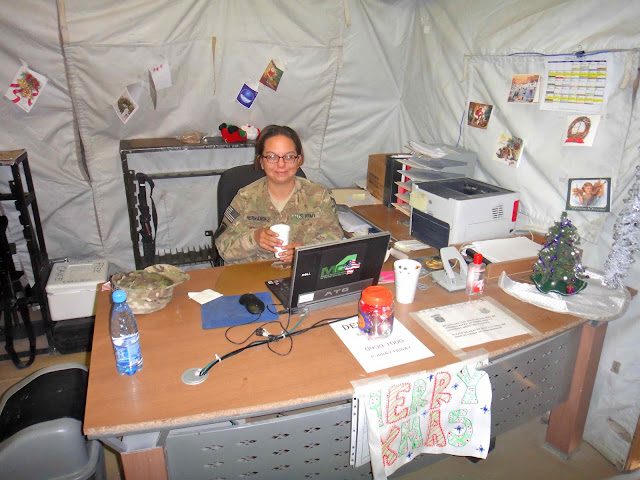 |
| SSG Dennull and SGT York |
The FST is co-located with the C company of the BSB (Brigade Support Battalion). C Company renders medical support to the Brigade, hence the name, "Charlie Med." One part of Charlie Med is the laboratory. The lab is staffed by SSG Dennull, who is the NCOIC of the blood bank, SGT York (no kidding, that's his name!), the NCOIC of the laboratory functions, and SPC Gaddis.
 |
| SGT York runs a lab test |
The laboratory can run most of the usual tests that a physician may order during sick call. They can even run cholesterol checks on soldiers over 50 for their periodic physical exams.
When the FST gets a trauma victim, the lab really shows their stuff. As soon as a casualty arrives in the ATLS section, at least 2 large bore (16g) IVs are started and a blood sample is drawn and sent to the lab for a "trauma panel." This checks the blood for electrolytes, blood gases, clotting factors, and red blood cell concentration. This gives us information as to how much blood has been lost, whether or not the blood has the ability to clot, and how well we are ventilating the patient. The lab also checks for the patient's ABO/RH (blood type). This information is on the patient's dog tags, but we don't trust it.
 |
| Type O Packed Red Blood Cells from the Red Cross |
 |
| Fresh Frozen Plasma |
If blood is needed, we start with type O packed red blood cells for everyone. Type O is considered the "universal donor." We usually give fresh frozen plasma with the PRBCs, to add the necessary volume and clotting factors. The bank stocks a par level of 40 units of O Pos PRBCs, 40 units FFP, and 20 units of cryoprecipitate (another clotting factor.)
If it looks as if we are going to need many units of blood, we activate the "Walking Blood Bank." The lab maintains a list of soldiers on the FOB who have consented to being blood donors when needed. These persons can be called at a moment's notice when their blood type is required for a casualty. They have been prescreened for HIV, hepatitis, ABO/RH, antibodies, and RPR. The lab folks just take a unit and run it back to us. This blood is type-specific, meaning that it is the same blood type as the patient. It is still warm when we administer it! Whole blood is the best at carrying oxygen and clotting. Many lives have been saved this way.
When to activate the Walking Blood Bank is a tough decision. We need to make the call early, as it will take at least 45 minutes to get the first unit. How many units to ask for is a hard call, as well. We want to only take what is needed, since the donor will not be able to give again for 56 days. Some blood types are rare. We only have 10 donors who are type AB Positive, for instance.
The database of screened blood donors currently has approximately 350 soldiers. Another 450 have been prescreened, and will be added to the database as soon as they are approved by the lab at Bagram.
The views expressed in this blog are those of the author only, and not necessarily of the US Army or the US Government. None of the information given is classified in nature.

































